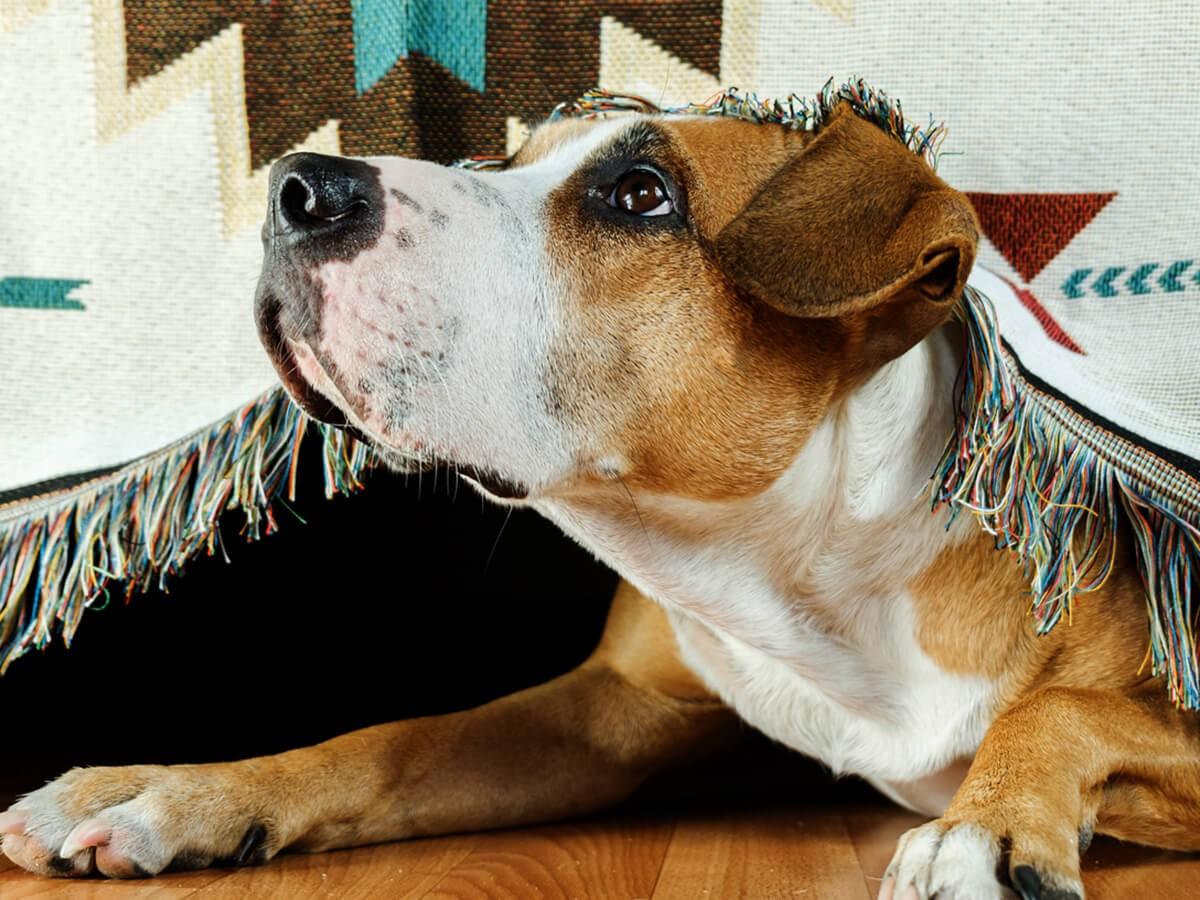Why are dogs scared of fireworks?
And how to calm dog firework anxiety
Firework season is upon us again and, for many pet parents, it’s a time of the year they dread because of their pets’ fear of fireworks. Rest assured that Spot Pet Insurance is here to help explain a bit about why dogs may be afraid of fireworks and provide tips to keep everyone calm and happy.
Why are dogs scared of fireworks?
You may be wondering, do fireworks hurt dogs’ ears? and the truth is that pets, especially dogs, can have severe reactions to loud noises such as fireworks. The noise and unpredictability trigger the fight-or-flight response. This is why you hear so many stories of pets running away on the Fourth of July. When they can’t run away from the noise, then you’ll see the signs of severe anxiety – shaking, whining, panting, urinating in the house, and more. These are the key signs of dog firework anxiety.
Preparing your pet for fireworks
We heard more fireworks in 2020 than usual. This was because municipal firework displays were canceled, and people decided to hold their own. However, fireworks sales are going up every year, even in areas where fireworks are illegal. You can post on Facebook, Next Door, and more, asking people not to light them off, but unfortunately, you’re not going to reach everyone or convince them to stop.
Much like human phobias, our pets can display a firework phobia or noise aversion, so it is important to care for their needs like we would our own. Here are some techniques on how to calm dogs and cats from fireworks.
1. Create a “safe room” with comforts.
First off, create a safe room. Remember that both cats and dogs experience a fight or flight response to noises they see as dangerous. You want to create an area they can “flight” to where they will feel safe and remain calm. Think of an interior room in the home or the basement. Some pet parents go an extra step by creating white noise in the safe room, such as running the dryer in a laundry room, fans in a closet, TV in an interior room, etc.
The goal here is to make a safe spot and provide distractions that can muffle the noise or block it out. If possible, you can have someone sit with them and give them reassuring attention. Other pet parents say they leave a blanket with the pet parent’s scent or put a thunder jacket on their pet.
Saferoom and comforts shortlist:
Interior “den” or hiding space
White noise
Thunder jacket
Clothing with pet parent’s scent
2. Ask your vet for medication advice.
You’re probably wondering, what can I give my dog for firework anxiety? Sedatives and medication are often the last resort but are sought by pet parents who either know their pet has anxiety problems or have been through the firework experience and never want to repeat it. Another option growing in popularity is CBD oil for pets.
While you’ll hear plenty of anecdotal stories of CBD oil, there have never been direct studies on the effects on pets. The American Kennel Club recommends talking to your vet about CBD oil or any other types of medication you are interested trying with your pet. And finally, there are also homeopathic medicines available from online retailers.
Medication options shortlist:
Sedatives prescribed from your vet
CBD oil
Homeopathic supplements
3. Training to counter dog firework anxiety
We’re going to put this one in a whole category by itself because it might be the best for this reason – you can’t control fireworks, thunder, or flashes of light. Remember how I said firework sales were up in 2020? Well, not only were they up 300%, but they were also going off year-round, not just for the Fourth of July.
If your dog is terrified of fireworks, training to help improve its response to this somewhat unpredictable stimulation will be the best course of action for its health in the long run.
I talked to a trainer, Sam, who explained his most successful training for fireworks, and it also works on thunder. He describes a combination of “successive approximation” techniques which include distractions and rewards. Sam said the most successful reward he’s used has been playing tug, which stimulates the prey drive. Food rewards can work on some dogs, but most dogs always have the prey drive somewhere in them. So the goal is to move from the fight-or-flight to the prey drive. Sounds challenging, but here are the steps.
1. Download firework sounds onto a device you can control the volume. Or look for a long video on YouTube on your smartphone.
2. Start the sounds low and raise slowly. You might want to have someone nearby to help so you can contrate on working with your pup.
3. Next, start playing tug with a rope or pull toy. Ensure your pup has their eyes focused on you and is entirely into the game, growling if possible.
4. When your pup starts looking at the speaker or phone or showing signs of anxiety, turn the sounds down. Start again, making sure your pup is into the tug game to stimulate their prey drive.
The successive approximation can be a great tool for puppies and fireworks, allowing them to get used to the stimulation while they are still growing.
Another training technique is “desensitizing.” Here you play the sounds of fireworks “below the threshold.” This means your pet can hear the sounds, but it doesn’t enact the fight-or-flight response. Again, you turn it louder as you feel your pet can handle the increases and are always prepared to turn it down as soon as you start to see signs of anxiety.
When in doubt regarding training techniques, seek out a pet behaviorist or veterinary behaviorist. Above all, you know your pet, and you know your limitations when it comes to training.
You’re not alone. Here are some comments from other pet parents:
“Trazadone was a game-changer for us.”
“We could tell when a storm was coming because our dog would go in a corner and pee himself.”
“Sedatives didn’t do anything for our dog, but homeopathic formulas worked.”
“Thunder shirt didn’t work, but my husband’s shirt tied around the dog did. It must have felt like a hug.”
You’re a rockstar pet parent for wanting to keep your pet safe and happy and lessen any potential anxiety.

Creative manager by day, pet enthusiast all the time! After 19 years with my dog (hopefully he wins the award for oldest pet in the world), I enjoy spending my days brainstorming tail-wagging content, and sniffing out the latest trends in the pet world.
Lombardi, Linda. “Fireworks Fears Can Change over Time, Study Shows.” Fear Free Pets, fearfreepets.com/fireworks-fears-can-change-over-time-study-shows/.
Mallenbaum, Carly. “How to Calm Scared Dogs during Fireworks Shows.” Axios, 30 June 2023, www.axios.com/2023/06/30/fireworks-dog-scared-how-to-calm.
Mathis, Savannah, et al. “A Systematic Review of the Efficacy of Compression Wraps as an Anxiolytic in Domesticated Dogs.” Animals, vol. 14, no. 23, 28 Nov. 2024, p. 3445, https://doi.org/10.3390/ani14233445.












